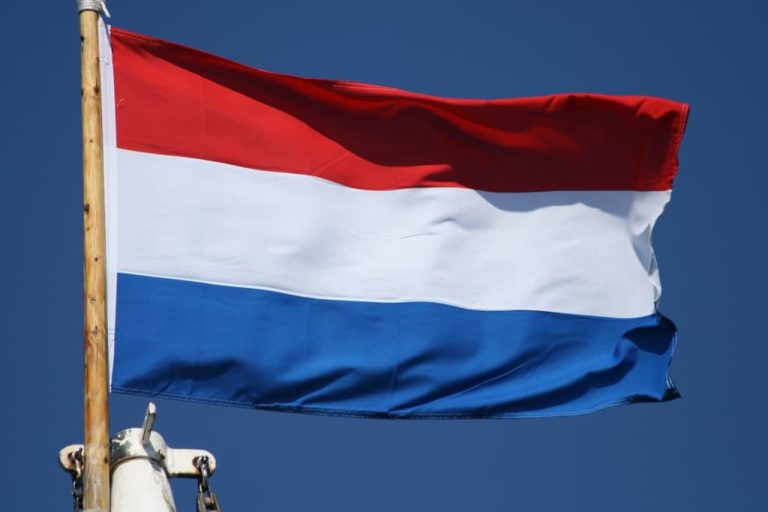18 de junio 2024

Children of Exile: The Births “Sowing Hope” in the Camp of Nicaraguan Farmers

PUBLICIDAD 1M
PUBLICIDAD 4D
PUBLICIDAD 5D
Loans and grants to the private sector were reduced by more than 83% in 2023, compared to 2022, according to Central Bank figures

Image of the flag of the Netherlands. Photo: Confidencial
The rupture of Nicaragua's diplomatic relations with the Netherlands directly hit the coffers of the Nicaraguan private sector, as loans and donations received in 2023 were reduced by US$196.1 million -83.4%- compared to 2022, reveals a foreign cooperation report by the Central Bank (BCN).
The private sector received 235.2 million dollars in loans and donations in 2022, but this figure was reduced to only 39.1 million dollars in 2023, according to the state report.
Nicaraguan businesses obtained 200.4 million dollars in foreign credits in 2022, of which 120.5 million dollars - 51% - were granted by the Netherlands, with whom the regime of Daniel Ortega and Rosario Murillo unilaterally broke off relations on September 30, 2022.
By 2023, foreign cooperation for the private sector plummeted. Of the 39.1 million dollars received, 33 million correspond to loans -mainly for the financial sector and the manufacturing industry- and 6.1 million were donations for the social and agricultural sector.
Of the $33 million in loans, $14.3 million dollars - 43.3% - came from the Netherlands Business Development Bank (FMO), according to the BCN.
The Netherlands has been the largest bilateral private sector cooperant in the last decade. Between 2017 and 2023, this European country granted Nicaraguan businesspeople some US$375 million in loans.
Relations with the Netherlands fragmented since 2018 when this country decided to suspend loans and grants for the public sector, as a form of international pressure for the Nicaraguan government to investigate "allegations of obstruction of medical assistance, the immediate cessation of violence and the dismantling of paramilitary groups" during the protests of that year.
In 2022, dictator Daniel Ortega declared the Dutch ambassador for Central America, Christine Pirenne, non grata and finally suspended diplomatic relations with the country. The president stated that the rupture was influenced by the unfulfilled promise to build the hospital on the Caribbean Coast.
Germany was another country that decreased its cooperation with the private sector, going from $45 million dollars in loans, in 2022, to granting only $5 million in 2023, 89% less.
This country has been a major cooperant since 2019. According to the Central Bank of Nicaragua (BCN) data, in the last decade private companies obtained 245.6 million dollars in German loans.
Norway, who delivered some $74 million dollars in loans since 2014, gave no more financing in 2023.
The private sector received US$13.5 million from multilateral donors in 2023. Some $12.5 million came from the Central American Bank for Economic Integration (BCIE - Banco Centroamericano de Integración Económica), and $1 million from the Inter-American Development Bank (IDB).
Bilateral donations to the business sector declined by 84% in 2023, from $34.8 million dollars in 2022 to receive only $5.7 million dollars.
The main donors were:
- Switzerland with $3.2 million dollars
- Spain with $1.7 million dollars
- Austria with $800,000 dollars
- European Union with $400,000 dollars
These funds were used for social programs such as: a geographic information system to support adaptation to climate change for small coffee growers in northern Nicaragua; a vocational training program for the employability of young people in Nicaragua; and climate-friendly production techniques for women farmers in Nicaragua. The family entrepreneurship programs in 15 municipalities of Las Segovias and community management of the Dipilto River Basin, among others.
While the private sector is losing more and more cooperation, the public sector reports slight growth. According to cooperation reports, in 2021 it reached the maximum ceiling of $1247.3 million dollars, influenced by the increase in cooperation due to the Covid-19 health emergency.
The following year, income dropped to $732.4 million and in 2023 it rose to $774.6 million. 97% of this amount came from financing from multilateral organizations, mainly from loans granted by BCIE.
"Loan disbursements increased by $31.7 million dollars (4.7%), over 2022 and grant disbursements increased by $10.5 million dollars (16.8%)," the report details.
As grants, the public sector received $73.4 million dollars, $10.5 million more than in 2022. Some $26.4 million were given by the European Union; $22.9 million by the WFP; $9.2 million by the Food and Agriculture Organization of the United Nations (FAO), among others.
This article was published in Spanish in Confidencial and translated by our staff To get the most relevant news from our English coverage delivered straight to your inbox, subscribe to The Dispatch.
PUBLICIDAD 3M
Confidencial es un diario digital nicaragüense, de formato multimedia, fundado por Carlos F. Chamorro en junio de 1996. Inició como un semanario impreso y hoy es un medio de referencia regional con información, análisis, entrevistas, perfiles, reportajes e investigaciones sobre Nicaragua, informando desde el exilio por la persecución política de la dictadura de Daniel Ortega y Rosario Murillo.
PUBLICIDAD 3D